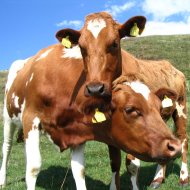
New regime will also impact Scottish dairy farms
Most Scottish beef farms will suffer financially under the new Common Agricultural Payments (CAP), research by Scotland’s Rural College (SRUC) has found.
The new regime will also have an impact on Scottish dairy farms. Yet it is the world market price for milk that will have a more direct effect on future viability.
The research briefings put together by SRUC’s Rural Policy Centre and will help to inform policy makers.
In the study, researchers used details from the Scottish Farm Accounts Survey, together with data from Quality Meat Scotland. They also carried out a survey with farmers, examining their reactions to various scenarios.
The data was then processed through ’Scotfarm’, SRUC’s own economic computer model, which produced a optimised net profit for each farm.
“We considered farm level performance before the new reforms and compared that with farm performance post-reform,” says SRUC senior agricultural economist Steven Thomson. “Whilst the model did not allow for the five year transition process, we believe the results offer policy makers a good indication of the long-term effects on key enterprises.”
Scotfarm found that specialist beef producers are most affected, predicting that over three-quarters of the FAS businesses would be in a worse position. Of these, around a third are expected to suffer reduced profits, while another this would move from a profit to a loss.
Furthermore, around 20 per cent of farm businesses already making a loss are likely to see greater losses under the new reforms. Just 13 per cent of farms, on more extensive systems, are predicted to make a profit.
When asked about their intentions, farmers indicated that if they experienced a 25 per cent increase in payment they would enlarge their herds. However, the same intention survey suggests that faced with a 25 per cent cut in subsidy payments, over half would decrease their livestock numbers.
“It will be important to consider the future resilience of the sector with so many farms predicted not to show a profit,” comments Steven Thomson. “With lower support payments we believe that the sector will become increasingly polarised as farmers respond by either focussing on environmental support and reducing herd sizes, or simply become more intensive.”
The majority of dairy farms in Scotland are also expected to have reduced levels of profitability. However, CAP support represents a lower proportion of incomes in the sector. Researchers say it is the future volatility of the milk price and input costs that will have a greater impact on long-term viability.
Even so, dairy farmers stated a reluctance to maintain expansion plans under a reduced CAP support regime. They suggested that support payments still have an influence on decision-making in the dairy sector, particularly following falls in the world milk price.



 The Federation of Independent Veterinary Practices (FIVP) has announced a third season of its podcast, Practice Matters.
The Federation of Independent Veterinary Practices (FIVP) has announced a third season of its podcast, Practice Matters.